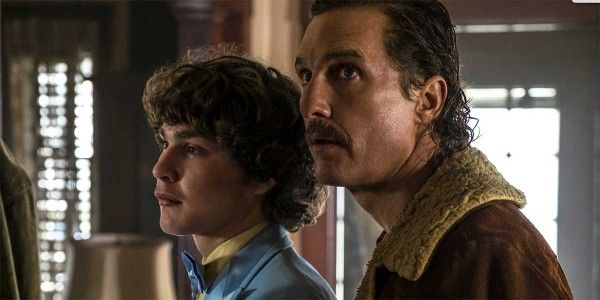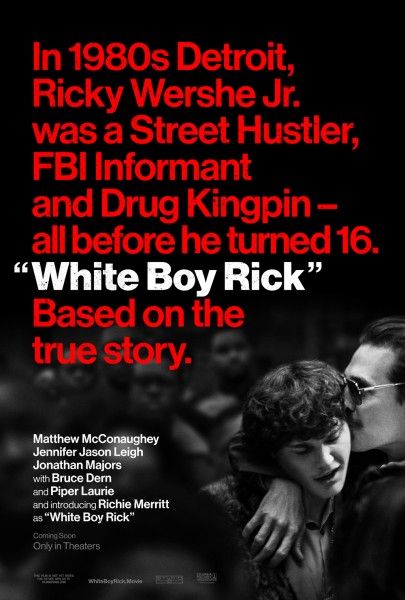In all fairness to White Boy Rick, its subject Rick Wershe Jr., does have a pretty incredible story in how he was able to be an FBI informant and a drug kingpin all before the age of seventeen. Unfortunately, Wershe’s story is one set in a black community, and yet none of the black characters seem to have any inner lives or even consciences. That’s only reserved for Rick and his family, the white characters in the movie. Granted, movies don’t have to service every single character that comes on screen, but it’s kind of bizarre to use a setting filled with African-American characters, and none of them really get a voice, and then the movie doesn’t even find anything particularly interesting to say with Wershe. If anything, the movie treats him with kid gloves and blame other factors—poverty, the feds, mandatory minimums—which deprives Wershe of the agency he needs to be an interesting character.
In 1984 in Detroit, Rick “Ricky” Wershe Jr. (Richie Merritt) works with his dad Rick Sr. (Matthew McConaughey) selling firearms to local gang members. As Ricky gets involved with a local gang, the FBI and local police recruits him to work as an informant and to make controlled buys so they can build a case against a local kingpin. As Ricky’s stature grows, he becomes accustomed to the game and he’s got the backing of law enforcement so that he can operate with relative impunity. As Ricky tries to hold his family together, including his addict sister Dawn (Bel Powley), his life of crime starts to catch up to him.
Although director Yann Demange shows off the same impressive visual style he demonstrated in his previous movie, the excellent ’71, here he’s shortchanged by a weak script that never finds a rhythm to Ricky’s story. It’s more of a dry chronology that may track with the true events of Wershe’s life, but doesn’t make for a particularly interesting character. There are brief moments where Ricky will wrestle with the consequences of his lifestyle, like when some local kids are shot in a drive-by orchestrated by the leader of Ricky’s gang, but the movie never really dwells on that. And yet because it wants to make Ricky a sympathetic character, it glosses over his criminal actions. Ricky is feeding drugs into the black community, but he can’t handle that his own sister is a drug addict. Wershe may be non-violent, but that doesn’t necessarily make him the hapless kid the movie makes him out to be.
The problem with White Boy Rick is that it wants to have it both ways on Wershe. On the one hand, it’s pretty incredible when you look at all he accomplished at such a young age. He’s unique because he was both an FBI informant and a drug kingpin, and so he must have the smarts and the skills to play the game. That’s certainly the way Merritt chooses to play the character, as self-assured and confident rather than a teenager in over his head. But then you can’t turn around and also say that Ricky is the victim of poverty or parental neglect or callous federal agents or an overzealous legal system trying to prosecute drug traffickers. For White Boy Rick, Ricky is responsible until he’s not, and then he’s a victim, which just doesn’t wash.
The compassion reserved for Ricky and his family doesn’t carry to the rest of the predominantly African-American cast, so the injustices visited upon Ricky feel hollow. When Ricky’s black friends get arrested and given long sentences, we don’t have a scene of Ricky bemoaning the criminal justice system. No one other than Ricky and his white family seem particularly bothered by criminal acts, whether it’s drugs flowing into the community or drive-bys that kill innocent kids. In this way, all the black characters serve as background to Ricky’s story, and Ricky’s story can’t decide if it’s about a young Scarface or a poor kid.
White Boy Rick is a prime example of when good craft can’t save a bad story. I’ll still be excited to see Demange’s next movie, and the performances are strong across the board. But none of that can overcome the shoddy way the script treats its black characters and how it can’t figure out the approach to its protagonist. Some interesting things happened to Rick Wershe Jr., but it led to an underwhelming and disappointing movie.
Rating: C-



